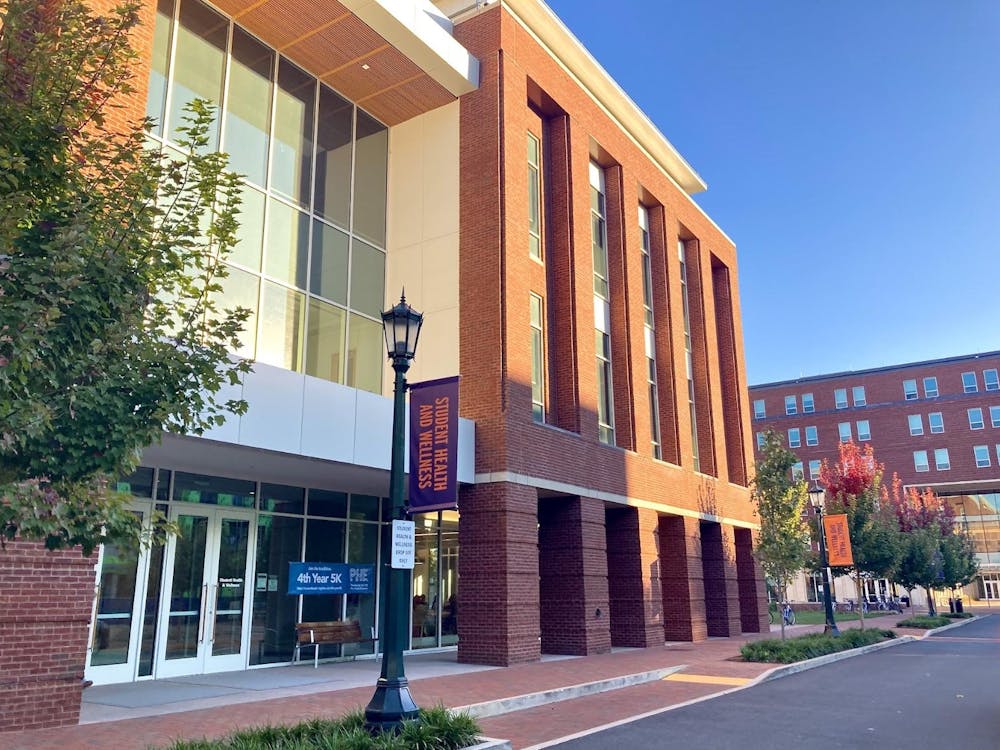All over Grounds, there are voices from the past. Even when no one else is around, a student can use their sage wisdom as a guide. While these quotes are not uncommon, one must often pay close attention to spot them. They cannot be heard. They speak only from words inscribed upon the walls of the University.
Second-year Engineering student Cody Dyke said the University's numerous formal inscriptions on buildings and other architecture give him a sense of tradition and remind him of "how old everything is."
The messages "add a sense of direction and focus" to life at the University, fourth-year College student Joe Jenkins said. "They were put there because they represent what the University believes in."
History Prof. Phyllis Leffler, who teaches a course on the University's history, said these values often come from strong connections to important historical figures.
"This is a university that has always taken history very seriously," Leffler said. "Remembering the important people who flowed through this university through their words adds to our status and thereby distinguishes us from other universities."
Setting forth these messages can be a careful and deliberate process. Leffler cited a 1914 exchange of letters between University Rector Armistead Gordon and President Edwin Alderman. The two men were debating the message to be inscribed on a new gateway.
One possibility raised by Alderman involved the word "service," to which Gordon responded negatively. The word inspired too many connotations of servitude and slavery along with "a whole vocabulary of reptilian words," Gordon wrote. He suggested using "truth" or "sacrifice" as the theme.
Alderman, on the other hand, wrote that the word "embodies the fundamental idea of democracy ... the apperception of it throughout all classes is the remedy of most democracy's perils."
The gateways at either end of Hospital Drive were completed in 1915. The inscription closest to the Corner, written by Alderman, appears to have been a compromise: "Enter by this gateway and seek the way of honor, the light of truth, the will to work for men."
Although many inscriptions have been around for a long time, students said they do not always notice them.
Dyke, for example, said he is unlikely to single out a quotation unless, perhaps, he is giving a tour to family or friends.
Jenkins said he found it unfair that some messages may go unacknowledged.
"If somebody put that much time into finding a saying or quote, then it should be noticed or appreciated," Jenkins said.
Sometimes, language acts as the barrier to recognizing the quotes.
Although the prominent inscription above Old Cabell Hall quotes the New Testament, it remains obscure because it is written in Greek.
Translated back to English, it reveals verse 8:32 from the Book of John and expresses the same values discussed by Gordon and Alderman: "And ye shall know the truth and the truth shall make you free."
Third-year College student P.J. Podesta described another value students can glean from the University's inscriptions -- a desire to change things in the world for the better.
Podesta pointed out the words etched above a side entrance to New Cabell Hall: "You are here to enrich the world and you impoverish yourself if you forget the errand."
Podesta said he was struck by this Woodrow Wilson quotation because "it's like a call to action," he said.
Podesta said he also appreciates the inscription because it provides texture to an otherwise plain building.
"It's a nice balance of something subtle and something interesting," Podesta said, noting that inscriptions can add class and a bit of tradition to buildings.
Dyke said in other instances, the words tend to blend in with their surroundings.
"It's not like it's colored or it sticks out," Dyke said, describing the message written atop Clark Hall.
Carved in large capital letters above the entrance, this message reads: "That those alone may be servants of the law who labor with learning[,] courage and devotion to preserve liberty and promote justice."
According to Dyke, the statement is a warning: "In today's terms, [it says] don't be lazy if you want there to be justice."
The legal nature of this motto is no accident: Clark Hall, dedicated in 1932, was built to house the Law School.
The advice itself was offered by then-law professor Leslie Buckler.
If Buckler's message sounds strangely familiar, it is possible someone has seen it somewhere else before.
In fact, although Clark Hall is far removed from the Law School's current North Grounds location, its students can still be familiar with the passage without ever setting foot on McCormick Road.
Clay Hall, the main entrance to the modern-day Law complex, features the very same inscription.
While the Clark Hall inscription is clearly located in plain air, others are much less noticeable.
Jenkins said he came across his favorite message completely by surprise. Hidden within an archway over one of the entrances to Monroe Hall is a large surface with the words, "I have sworn upon the altar of God eternal hostility against every form of tyranny over the mind of man."
Jenkins said he remembered the message because "it was really forceful."
The sentence is excerpted from a letter written by Jefferson in 1800.
"Jefferson's vision is fundamental to this place," Leffler said, adding that it fills many parts of the University's modern visual space.
However, like many inscriptions around Grounds, the Monroe Hall quotation features no indication of its author.
Jenkins said this adds a little mystery that helps keep the inscriptions intriguing.
"I like it not being there because the words can be tainted by a person's name, and then you wouldn't appreciate what they're saying," Jenkins said.
Inscriptions around Grounds are a common, yet educational part of the University experience.
The inscriptions represent "an older generation passing on knowledge," Jenkins said.




